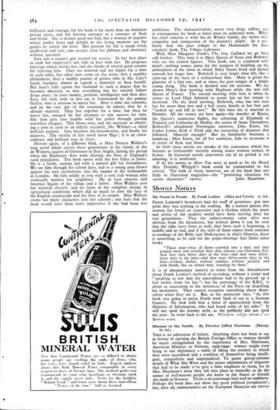Shorter Notices
My Name is Frank. By Frank Laskier. (Allen and Unwin. 2S. 6d.; FRANK LASKIER'S broadcasts had the stuff of greatness : put into print they lose nothing in the reading. By a natural genius this seaman has found an expression and a rhythm which the poets and artists of the modern world have been striving after for two generations. That the subject-matter came alive was obvious from the broadcasts, but written down it can be seen that the talks have form as well; they have each a beginning, a middle and an end, and if the style of them comes from constant re-readings of the Bible and Shakespeare in ship's libraries, there is something to be said for the paper-shortage that limits other books.
" These men—four of them—crawled into a boat and they
pushed away and watched their ship sinking—on Christmas Eve. And they were thirty days in the boat—and they were thirty- three days in the boat—and they were thirty-seven days in the boat—without shelter, without comfort, without security and with Death, like an armed man, standing by them."
It is of documentary interest to learn from the Introduction about Frank Laskier's method of recording, without a script and " speaking so low that the microphone had to be pressed up a few inches from his lips "; but the patronage of the B.B.C. is about as nauseating as the insistet.ce of the Press on dispelling his anonymity. They cannot recognise something above them- selves when they see it. But, as the postscript says, " As this book was going to press, Frank went back to sea as a Seaman Gunner. He took with him a letter of appreciation from the Minister of Information, who had heard some of his talks." It will not spoil his literary style, as the publicity did not spoil the man : he went back to the sea. 04A ..CT(T12 KA76CE6 7r4 V711. I" VI, OMMOW Kas4.






















 Previous page
Previous page